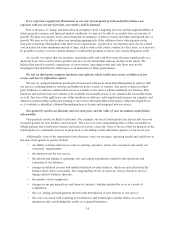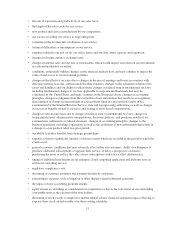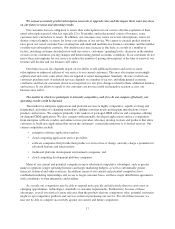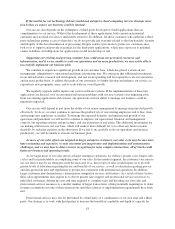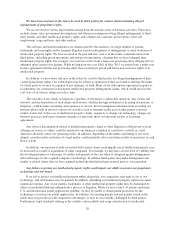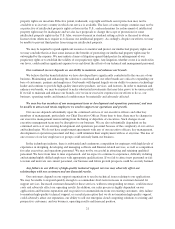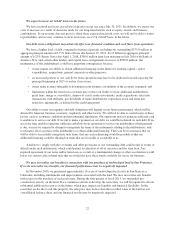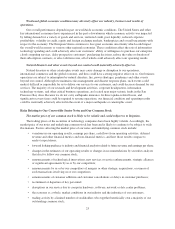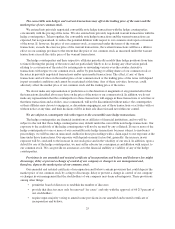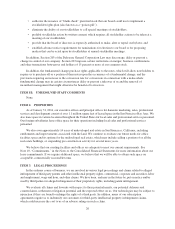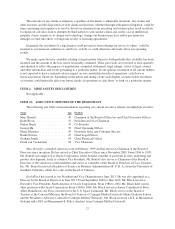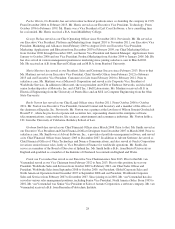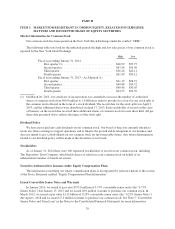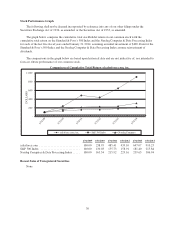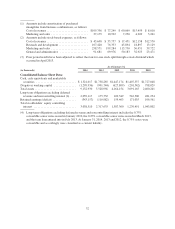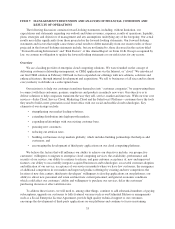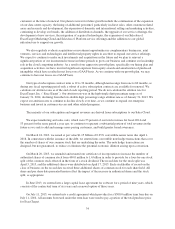Salesforce.com 2014 Annual Report Download - page 28
Download and view the complete annual report
Please find page 28 of the 2014 Salesforce.com annual report below. You can navigate through the pages in the report by either clicking on the pages listed below, or by using the keyword search tool below to find specific information within the annual report.• the issuance of shares of common stock by us, whether in connection with an acquisition, a capital
raising transaction or upon conversion of some or all of our outstanding convertible senior notes;
• issuance of debt or other convertible securities; and
• any other factors discussed herein.
In addition, if the market for technology stocks or the stock market in general experiences uneven investor
confidence, the market price of our notes and underlying common stock could decline for reasons unrelated to
our business, operating results or financial condition. The market price of our notes and underlying common
stock might also decline in reaction to events that affect other companies within, or outside, our industry even if
these events do not directly affect us. Some companies that have experienced volatility in the trading price of
their stock have been the subject of securities class action litigation. If we are the subject of such litigation, it
could result in substantial costs and a diversion of management’s attention and resources.
We may issue additional shares of our common stock or instruments convertible into shares of our
common stock, including in connection with the conversion of the notes, and thereby materially and adversely
affect the market price of our common stock and the trading price of the notes.
We are not restricted from issuing additional shares of our common stock or other instruments convertible
into, or exchangeable or exercisable for, shares of our common stock during the life of the notes. If we issue
additional shares of our common stock or instruments convertible into shares of our common stock, it may
materially and adversely affect the market price of our common stock and, in turn, the trading price of the notes.
In addition, the conversion of some or all of the notes may dilute the ownership interests of existing holders of
our common stock, and any sales in the public market of any shares of our common stock issuable upon such
conversion of the notes could adversely affect prevailing market price of our common stock. In addition, the
anticipated conversion of the notes could depress the market price of our common stock.
We may not have the ability to raise the funds necessary to pay the amount of cash due upon conversion
of the notes or the fundamental change purchase price due when a holder submits its notes for purchase upon
the occurrence of a fundamental change.
Upon the occurrence of a fundamental change, holders may require us to purchase, for cash, all or a portion
of their notes. In addition, if a holder converts its notes, we will generally pay such holder an amount of cash
before delivering to such holder any shares of our common stock.
There can be no assurance that we will have sufficient financial resources, or will be able to arrange
financing, to pay the fundamental change purchase price if holders submit their notes for purchase by us upon the
occurrence of a fundamental change or to pay the amount of cash due if holders surrender their notes for
conversion. In addition, agreements governing any future debt may restrict our ability to make each of the
required cash payments even if we have sufficient funds to make them. Furthermore, our ability to purchase the
notes or to pay cash upon the conversion of the notes may be limited by law or regulatory authority. In addition,
if we fail to purchase the notes, to pay interest due on, or to pay the amount of cash due upon conversion, we will
be in default under the indenture, which in turn may result in the acceleration of other indebtedness we may then
have. If the repayment of the other indebtedness were to be accelerated, we may not have sufficient funds to
repay that indebtedness and to purchase the notes or to pay the amount of cash due upon conversion. Our
inability to pay for your notes that are tendered for purchase or upon conversion could result in your receiving
substantially less than the principal amount of the notes.
The fundamental change provisions may delay or prevent an otherwise beneficial takeover attempt of us.
The fundamental change purchase rights, will allow holders to require us to purchase all or a portion of their
notes upon the occurrence of a fundamental change. The provisions requiring an increase to the conversion rate for
conversions in connection with a make-whole fundamental change may in certain circumstances delay or prevent a
takeover of us and the removal of incumbent management that might otherwise be beneficial to investors.
24


